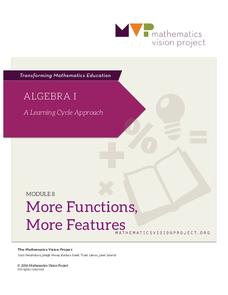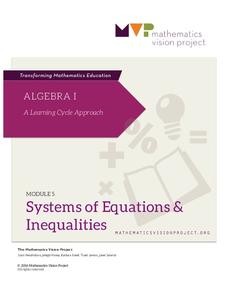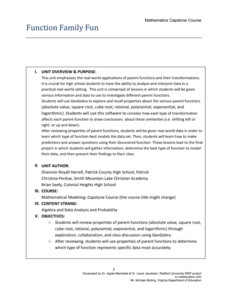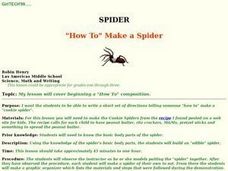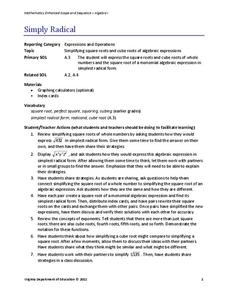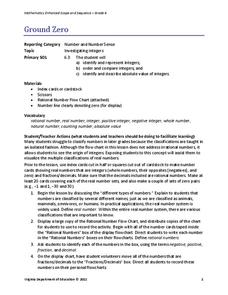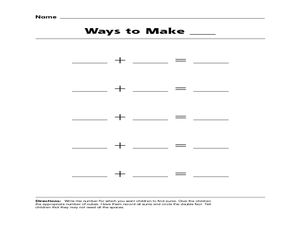Mathematics Vision Project
Module 8: More Functions, More Features
A piece of this and a piece of that, add domain restrictions and create a piecewise function. Young scholars explore piecewise functions with and without context. Functions include both linear and quadratic parts. The module is the...
Mathematics Vision Project
Module 5: Systems of Equations and Inequalities
Systems of equations and inequalities model contextual situations. A set of 12 lessons build a solid understanding of writing and solving systems of equations and inequalities using a variety of methods. The module is the fifth in a...
Mathematics Vision Project
Module 6: Quadratic Functions
Linear, exponential, now it's time for quadratic patterns! Learners build on their skills of modeling patterns by analyzing situations with quadratic functions. The sixth module in the Algebra I series has pupils analyze multiple...
Mathematics Vision Project
Module 2: Congruence, Construction and Proof
Construct yourself a winning geometry unit. A set of lessons introduces geometry scholars to constructions and proofs with compasses and straightedges. It also covers triangle congruence through transformations. This is the second of...
Concord Consortium
In Oz We Tryst
The shortest distance from point A to point B is a straight line, but measuring distance gets more complicated when there are three points! Given the location of three friends, individuals determine the best point for all three friends...
Mathematics Vision Project
Module 9: Statistics
All disciplines use data! A seven-lesson unit teaches learners the basics of analyzing all types of data. The unit begins with a study of the shape of data displays and the analysis of a normal distribution. Later lessons discuss the...
Mathematics Vision Project
Module 5: Circles A Geometric Perspective
Circles, circles, everywhere! Pupils learn all about circles, central angles, inscribed angles, circle theorems, arc length, area of sectors, and radian measure using a set of 12 lessons. They then discover volume formulas through...
Corbett Maths
Perpendicular Bisector
Where should the statue be located? The resource explains how to use a compass and straight-edge to construct the perpendicular bisector of a line segment. Using an exam question, the narrator models how to solve an application problem...
Corbett Maths
The Range
Spread the data out on the range. The short video provides a definition of the range. Using a data set of five numbers, the resource calculates the range.
College Board
Random Variables vs. Algebraic Variables
Variables can vary in meaning. A reference material for AP® Statistics explains the difference between random and algebraic variables. It provides a hypothetical situation involving dice—great for use in a classroom situation.
Radford University
Function Family Fun
It's time for a family reunion—function families, that is. Pupils first review different types of parent functions. They then see how to apply transformations to graphs and learn how to select the most appropriate type of function to...
Radford University
Parallelogram Task
These floors were made for learning. Pupils use coordinate planes drawn on the classroom floor using tape to investigate parallelograms. They measure lengths, angles, and slopes to identify properties of parallelograms.
EngageNY
Curves from Geometry
Escape to investigate hyperbolas. Pupils take a look at what happens to the elliptical orbital path of a satellite that exceeds escape velocity as the opener to the eighth lesson in a unit of 23. Scholars analyze basic hyperbolas and how...
Flipped Math
Calculus AB/BC - Limits at Infinity and Horizontal Asymptotes
Learning about end behavior means it's close to the end of the unit. The 16th of 18 lessons in Unit 1 - Limits and Continuity has scholars watch a video to learn how limits at infinity can be used to determine horizontal asymptotes and...
CPO Science
Physics Skill and Practice Worksheets
Stop wasting energy searching for physics resources, this comprehensive collection of worksheets has you covered. Starting with introductions to the scientific method, dimensional analysis, and graphing data, these skills practice...
Virginia Department of Education
Synthesizing to Support a Thesis- Big Picture Emphasis
Help your researchers as they begin to develop a topic for research with these worksheets. Included are two nicely designed graphic organizers that assist students in narrowing and researching their topic, and an efficient evaluation...
Curated OER
Biggest Trees in the United States
Students use the Internet (or printed sources) to locate information. They fill in missing information on a graphic organizer (chart) and use the data to answer questions. The research skills help students to develop higher order...
EngageNY
Advanced Factoring Strategies for Quadratic Expressions (part 2)
What do you do with a difficult-to-factor quadratic expression? This lesson provides the answer. Pupils learn a grouping strategy to help factor trinomials. When guess and check seems too tedious, this method is the "works every time"...
Curated OER
Spider "How To" Make a Spider
Young chefs follow the set-by-step instructions of a recipe and use their prior knowledge of the body parts of a spider to make edible spider cookies. After completing a pre-writing graphic organizer they then write a "how to" paragraph...
Virginia Department of Education
Simply Radical
Simplifying is radical, dude! After reviewing how to simplify square roots of whole numbers, scholars consider how to simplify square roots of algebraic monomials. Also taken under consideration is how to simplify cube roots of whole...
Virginia Department of Education
Transformationally Speaking
Young mathematicians explore transformations of graphs by graphing sets of functions on the same pair of axes. They use their graphs to determine the effect that the values of a and b in y = ax + b have on the graph of y = x.
Virginia Department of Education
Ground Zero
Don't harbor any negative feelings toward negative numbers. Scholars learn about different classifications of rational numbers, including negative integers. They also develop definitions of the opposite and the absolute value of a...
Curated OER
Tic-Tac-Toe Note Organizer
In this organizer worksheet, students divide a sheet of paper into nine tic-tac-toe sections on which to take notes. The worksheet is a generic, blank graphic organizer.
Curated OER
Math Organizer: Way to Make a Sum
For this sums worksheet, students write 5 ways to make a given sum. Worksheet is a generic graphic organizer with a blank space at the top to write the sum being asked for.


